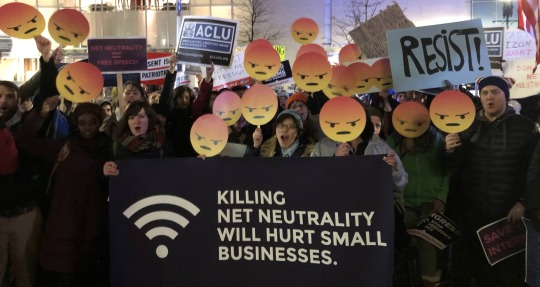TUESDAY: Net neutrality supporters plan mass protest –– online and off –– as countdown starts for Senate vote to block FCC repeal

FOR IMMEDIATE RELEASE, February 26, 2018
Contact: Evan Greer, 978-852-6457, press@fightforthefuture.org
Major websites like Tumblr, Reddit, Medium, and Etsy join online protest, in-district events planned in 8 key Senate districts, rally in Washington, DC
Net neutrality supporters and major web platforms like Reddit, Tumblr, Etsy, Medium, and GitHub are planning Operation: #OneMoreVote, a mass day of online and offline action this Tuesday, February 27, to secure the final vote needed to pass a Congressional Review Act (CRA) resolution in the Senate to block the FCC’s resoundingly unpopular repeal of rules that prevent Internet providers from controlling what websites and apps web users can use with censorship, throttling, and new fees.
Internet users, small businesses, online communities, public interest groups and popular websites will harness their reach to flood lawmakers with phone calls and emails from constituents, while high-traffic websites will help sound the alarm with prominent alerts encouraging visitors to take action. Offline, net neutrality supporters will gather outside 8 key Senate offices across the country, as well as at a rally outside the Senate in Washington, DC.
The day of action is being organized by Fight for the Future, Demand Progress, and Free Press Action Fund, the groups behind BattleForTheNet.com and many of the largest online protests in history. Well-known companies like Reddit, Tumblr, Etsy, Medium, Vimeo, Imgur, Namecheap, DuckDuckGo, Private Internet Access, Fiverr, Patreon, and KnowYourMeme, Sonos have announced their participation, along with groups like Consumer Reports, the ACLU, Common Cause, Engine, CCIA, Change.org, National Hispanic Media Coalition, and Creative Commons. Participants continue to stream in as the date approaches.
“The CRA is a simple up or down vote on the future of the free and open Internet. There are fifty US Senators who have a decision to make: are they going to listen to lobbyists who are paid to lie to them, or are they going to listen to their constituents and small businesses in their district?” said Evan Greer, campaign director of Fight for the Future. “Internet users need net neutrality protections now, not months or years from now as court battles play out and Congress deliberates on legislation that’s unlikely to pass, and might not protect us even if it did. Make no mistake: every member of Congress who fails to publicly support the CRA is casting their vote against net neutrality, and will be seen by voters as an enemy of Internet freedom come election time.”
The FCC’s resoundingly unpopular net neutrality repeal was published in the Federal Register last week, officially starting a countdown of 60 legislative days to pass a Senate resolution to reverse the order. 50 senators have already come out in support of the CRA, which would overturn the FCC’s December 14th decision and restore net neutrality protections that are supported by more than 83% of voters from across the political spectrum. The February 27th push is laser-focused on securing the final vote needed to pass the resolution in the Senate. Advocates will also take the fight to the House of Representatives, where net neutrality supporters plan to wage an all-out war to reach the 218 supporters (a simple majority) needed to force the CRA to the floor.
If the CRA passes both houses, it will go to the President’s desk. The White House—which has criticized mergers and other actions by large telecom companies—has been noticeably quiet about the FCC repeal, which was unpopular with voters from across the political spectrum including 3 out of 4 Republicans. While a veto is possible, the reality is that no one can predict what Trump will do. Republican FCC Commissioner O’Rielly told Politico in January that he was unsure President Trump would veto a CRA if it landed on his desk.
Over the last year net neutrality has emerged as a mainstream political issue, with millions of people contacting their lawmakers, broad participation from small businesses, major web companies, and even brands like Burger King, and hundreds of volunteer-led grassroots protests, in-district meetings, and petition deliveries to congressional offices. Previous days of action on July 12 and December 12 drove unprecedented numbers of phone calls, emails, and comments to lawmakers and the FCC.
###

